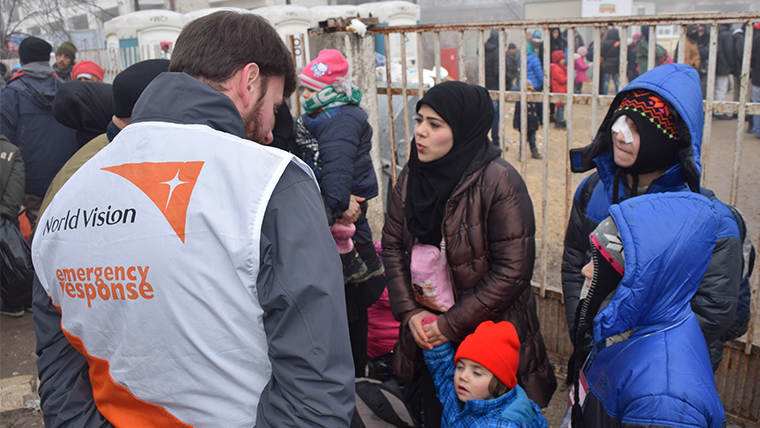Serbia: Sadness starts in the South
By Gavin Crowden, Head of Policy and Public Affairs, World Vision UK
As I packed and prepared to travel to Serbia last week, I kept thinking what leaving was like for the refugee children and their families I'd meet. How did they prepare? What did they pack? Where were they going?
I find leaving my family tough - it's one of the things not really spoken about in humanitarian circles. And this time was tougher still as my wife is seven months pregnant and my two-and-a-half-year-old son now gets the concept of Daddy not being around.
And when you think about coming back home in a week’s time, you never know what you will have seen. What tough stories you will have heard. Travel like this cannot leave you unchanged. Nor should it.
I spent a week walking with refugees - men, women and children - who had fled horrors. In Syria. In Iraq. In Afghanistan.
I met exhausted families arriving into Serbia at its southern border with Macedonia. I spoke with families in Presevo, a few miles north, where their paperwork gets processed. I travelled the eight hours to northwest Serbia where a petrol station now doubles as a resting place for refugees before they board the trains that will take them on to Croatia.
I walked 'with' refugees, along the same path. And I saw the work World Vision is doing to support children and their families on that journey.
One of the first things which children see when they arrive at the Serbian border is a small World Vision portacabin. There a table is laden with gloves, boots, and coats - the things the kids need to keep them warm, as they often arrive ill equipped to face a Serbian winter. It is below zero, and I'm told by our team there that they were lucky not to have arrived a week before, when temperatures plummeted to -17.
At the other end of these families’ journey in Serbia, near the northern border with Croatia, World Vision has set up two child friendly spaces. These are safe, play areas for kids where a trained counsellor is on hand to lend help and support.
At one of those I spoke with a Mum-of-two while she watched her children playing. She told me she had packed as much as they could carry for her children when they left Syria.
But they had been forced to dump much of what they took - extra clothes and blankets - by a Turkish quayside. There was no room for anything else on the boat that would take them to Greece. That boat had been built to take 35 people, but there were over 70 crowded on. They were simply told to dump their bags or get off the boat.
This is the same journey that has seen many people drown already this year, children amongst them. Last year over 3,700 men, women and children drowned trying to cross the Mediterranean; this year it is feared that this number will be 'beaten'.
And people are paying 1200 Euros each for the privilege of making that perilous journey, often in the dead of night.
I asked a mum, travelling with four children, how many nights her children had slept in a bed since they left home a month ago. Her answer will stay with me for a long time:
"You ask how many times my children have slept in beds. Why just this journey? My children have not slept through the night for four years. They wake up screaming from nightmares from the bombing. They are scared. And you ask only about the last month?"
This was a fair rebuke. And a reminder for me that this family’s struggle is not limited to the journey, but for the five years this conflict has raged.
So I started asking people why they decided to leave Syria now, after almost five years of conflict. The answer was striking. As one woman put it, “There is nothing there for us. No food, water. Nothing. There are no jobs. No future."
These are the third or fourth wave of refugees: the first left when the bombing started; the second when it was clear the bombs wouldn't stop.
Now people are leaving because of the chronic impacts: an infrastructure destroyed,non-existent services, no schools for their children. Even the notion of home has changed. For many 'home' is no longer a physical place but wherever those they love and care for are. Many are travelling to reunite with family - with brothers and sisters, aunts and uncles - who fled years ago.
And still the bombing continues - of course - mentioned by many like an afterthought. It has become such a regular part of their lives it is almost normal. One family said they decided to leave only after their third apartment had been bombed. Their third!
There is a saying in Serbia: 'Sadness Starts in the South'. It's because it is the poorest, most deprived part of the country.
But for exhausted families coming from Syria it looks a little different.
It marks another stage on their long journey. Another country passed through; another unfamiliar country to come. Another step closer to being able to stop.
To rest.
To recover.
And maybe - just maybe - to hope.
You can show your support for children and families like the ones I met in Serbia - those children paying the real cost of war. You can join me by going barefoot&coatless on 10 February and standing in solidarity with the children going through what no child ever should »
